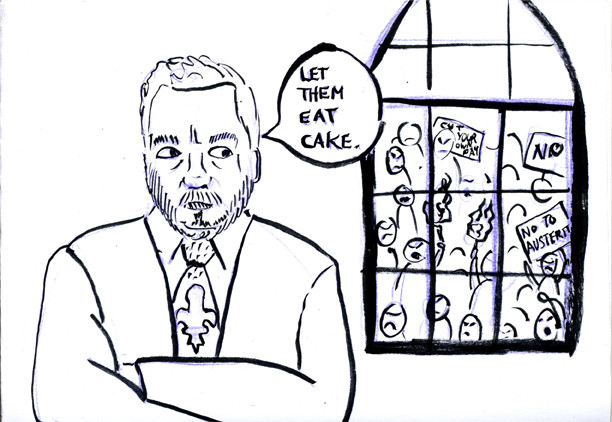Resisting Cuts In and Out of the Classroom
School of Community and Public Affairs Students and Faculty Oppose Quebec Austerity
This autumn marks the beginning of yet another round in the fight against the Couillard government’s continuing budget cuts.
Students, teachers, public sector workers and community groups are just some of the citizens who are standing up and speaking out. Witnessing the rapid deterioration of crucial services within our education system and throughout all of society as a result of austerity policies, undergraduate and graduate students as well as faculty at Concordia University’s School of Community and Public Affairs (SCPA) wish to publicly contest our government’s political choices.
Austerity measures are not a new feature in this province. Both federally and provincially, governments have engaged in a style of fiscal purging for decades. According to recent data released by the Montreal social and economic research institute, IRIS, we have seen $3.5 billion dollars in cuts since 2014 across all programs and services.
Kindergarten programs have been cut in some school boards while others have opted to increase service fees, thereby doubling fees on pedagogical days. Many support staff positions, which provide crucial support to teachers and children with special needs, have also been cut.
In the wake of the significant job losses and rising food costs brought about by the 2008 economic downturn, community and social economy organizations have been called upon to deal with increasing, unmet needs despite the tremendous strain on their budget. These groups are part of the social fabric in place meant to support the most vulnerable members of society.
Yet the Couillard government continues to undermine these programs by decreasing government funding, while, paradoxically, increasing at the same time the demands on these organizations. Essential programs and services (in education, health, employment support, social housing and local development) are now under attack. These programs respond to real needs that contribute to a healthier, more fair and more cohesive society. Austerity measures undermine what we, as a society, have collectively fought for.
The strategy of austerity politics, despite being consistently proven as ineffective and even detrimental, is based on a misguided notion of economic necessity. As policy analysts, social researchers and economists alike continue to detail the emerging social, economic, and moral damage from such dangerous and dead-end measures, the wide ranging impacts of austerity are only beginning to become clear.
As thousands of people take to the streets to denounce policies which target our values of social justice and democratic representation, our government continues to move towards ruthlessly cutting expenditures that support the functioning of our most valued institutions and services. Rather than imposing cuts to essential public services and abolishing essential programs, the government should start by redirecting its massive subsidization of large corporations to more purposeful investment in the public health and education sectors.
The Plan Nord project, for example, has already cost the province $1.9 billion dollars, even though, between 2006 and 2011, 55 per cent of mining companies paid no royalties to Quebec, and at the same time contaminated land and displaced indigenous groups including the Cree, Inuit, Innu as well as Naskapi communities. The winners in such initiatives are clearly not the Indigenous communities, the Quebec population or even the economy as a whole, but rather the foreign mining and energy companies that profit handsomely and inequitably from Quebec’s natural resources.
To balance the budget the government could decide to increase its revenues by reconfiguring Quebec’s personal income tax brackets from four to eleven. This change would generate approximately $1 billion in extra revenues while simultaneously allowing 94 per cent of the population to pay less taxes. A recommendation to re-implement the capital gains tax, abolished in 2011, would generate about $600 million dollars in revenue per year.
Fighting corruption and ending tax evasion are also viable alternatives to balancing the budget. These are just some of the alternatives to austerity in the document 10 Billion Solutions, released in early 2015 by the Coalition against user fees and the privatization of public services. Yet the government systematically chooses to ignore these options and instead relentlessly promotes an ideology that results in slashing our most vital social services.
Students from Concordia and UQAM, who vigorously challenged these policies, are now facing charges stemming from their participation in last Spring’s strike action. As well, community groups are organizing against cuts and repressive legislative proposals such as The Lobbying and Transparency Act (Bill 56) which, if implemented, will create greater bureaucratic roadblocks that will impede the capacity to engage in work that directly supports the well-being of people and communities.
The aggressive police measures and fear tactics that continue to be used on demonstrators force many to question their willingness to practice their right to protest. These policies serve not only to abolish services won over long periods of struggle, but nourish a culture of isolation, individualization, and fear of critical civic engagement.
A key moment in our history was when the State began playing a greater role in ensuring the provision of a number of collective goods and services while limiting the role and the ill effects of a market-driven economy. As the State moves away from investing in the public realm, these sectors risk becoming privatized and devalued.
Austerity is a political ideology, not an economic necessity. Is the social agenda it promotes really what we need and want? A society where market imperatives and unsound economic reasoning take precedence over the social cohesion and well-being of the most vulnerable amongst us?
These ill-advised and dangerous budgetary practices of our government have taken us in the absolutely wrong direction. In its place, we propose a vision of shared collective resources, one based on the principles of social solidarity and social justice.
The undergraduate student association of the School of Community and Public Affairs voted to strike in solidarity with teachers on Sept. 30 as well as in support of community and public sector workers from Nov. 2 until Nov. 6.
Students and faculty alike are committed to contributing to the public discourse on these austerity measures through organizing panels and public dialogue as well as integrating it as a common thread in course content. The School of Community and Public Affairs understands that a toxic result of austerity measures is the polarization between various groups.
This letter is a student-faculty collaboration, and should be viewed as an act of resistance to the disastrous consequences outlined above. We, the undersigned at the SCPA, recognize the importance of all collective actions and will continue resisting austerity measures both in the classroom and on the street.
School of Community and Public Affairs Student Association
and
Anna Kruzynski, associate professor
Bertrand Loiselle, part-time faculty
Daniel Salée, professor
Elsa Beaulieu Bastien, part-time faculty
Frances Ravensbergen, part-time faculty
Jason Prince, part-time faculty
Norman Nawrocki, part-time faculty
Peter Graham, part-time faculty
Pierre Morrissette, part-time faculty


_600_832_s.png)



